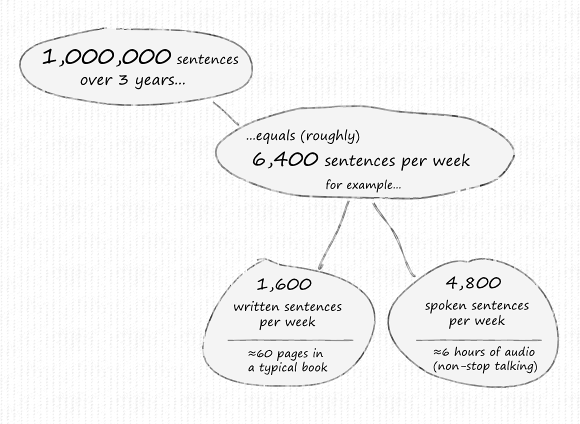by
Tomasz P. Szynalski
How much information do you need?
Few people
realize that learning a language fluently is a much more memory-intensive task
than, say,
learning organic chemistry or the history of Europe at an expert level.
Let's consider the number of facts you need to know to produce correct
English sentences with ease.
Certainly you must know the meanings and pronunciations of something like
10,000 words and phrases — the contents of a medium-sized dictionary. But this
is only half the picture. The other half are thousands upon thousands of
little facts which tell you when to use different words and how to combine them with
other words:
·
We
say “I walk”, but not “he walk”; “he says” but not “he mays”; “Is
she young?”, but not “Looks she young?”; “He did it”, but not “He didn’t
it”; “She looked beautiful”, but not “She dressed beautiful”.
·
We
say “Mary likes cheese very much”, but not “Mary very much likes cheese”;
“He might have eaten the cake”, not “He could eat the cake” or “He
has might eaten the cake”; “What did he eat?”, not “What he ate?”, “What
he did eat?” or “He ate what?”.
·
We do an
exercise, but make a mistake; make a
phone call, but have a conversation; do a
job, but take a break; take a
step, but make a jump.
·
You
can have a bad/terrible headache, but not astrong/heavy
headache; you can getgreat/enormous satisfaction, but not big
satisfaction; you can be a heavy smoker, but not a hard/strong
smoker; you can have a heated debate, but not a burning
debate; you can have afast car, but not a fast look;
you can clean your teeth, but you cannot clean the
dishes.
·
We talk about something, comment onsomething and discuss
something; succeed insomething, but fail at something; ask
a questionof somebody, but have a question for somebody;accuse
somebody of something, but blame somebody for something; answer
an e-mail, butreply to an e-mail.
·
You
can give an opinion, but not an advice; buy
a cake, but not a bread; move a table, but
not a furniture; share a fact, but not an
information.
·
You
can ask somebody to do something, but notsuggest somebody to
do something; you can tell somebody something, but
not explain somebody something; we encourage
somebody to dosomething, but discourage somebody from
doing something; we tell/want/get/allow somebody to
go, but let/make/see/hear somebody go.
A book like Michael Swan’s Practical
English Usage has 600 pages of facts like these.
And I wish I could tell you that they are unnecessary — that you can just
ignore them — but the fact is, Iobey virtually all of these rules
when I speak or write in English, and so does anyone who is fluent.
If knowing a language requires so much knowledge, then how come everyone
can speak at least one language fluently? We are not all Einsteins.
There are many native English speakers who are not very skilled at acquiringknowledge, yet all of
them successfully use the English that is spoken in their community (whether it
is standard English or the Black
English Vernacular).

A
face you recognize.
The reason why we can memorize a huge database of language facts is the
same reason why we can recognize faces. Consider how much information is
required to recognize that Bill is really Bill: the dimensions of the head, the
colors, shapes, relative sizes, and positions of the eyes, nose, eyebrows,
lips, teeth, ears, chin, cheeks, forehead, hairline, hair, wrinkles, spots and
facial hair. If I were to write down a precise description of just one
face, imagine how many sheets of paper that would take, and how hard it
would be to memorize. Yet all of us (even people with a poor memory) can
recognize thousands of faces and it takes only a blink of an eye in
each case.
We can do this because we don’t have to memorize people’s facial features
like we would memorize history facts. Our brain has a special module which can instantly grab all the data as
we look at a face. Then, when we look at a face, this module can answer the
question “Do I know this face?”. It all happens effortlessly and subconsciously. We never have to think “Um, the convex shape of this person’s nose, the distance
between the eyes, and the asymmetrical upper lip match my friend Peter”.
Just as everyone (smart or
not) has a face recognition module, everyone has a language module.
This module stores facts
about word meaning, word usage,
grammatical structures, pronunciation, etc., so you don’t have to memorize them
like you would memorize history facts. While the face recognition module lets
you answer the question “Do I know this face?”, the job of the language module
is to produce correct sentences based on what it has learned about language.
How does the language module get its facts about language? Unfortunately,
it takes more
than a quick look. Long lists of rules (like the one above)
won’t help either — the language module evolvedlong
before there were grammar books, so it doesn’t understand grammar rules. The
module get its information from example sentences. As you read and
listen to correct sentences in a language, it builds, piece by piece,
a database of facts about that language.
How much input do you need?
All right, so the language module in your brain needs correct
sentences. But how many sentences do you actually need to become fluent
in a language?
First of all, the question is a bit misleading,
because there isn’t a single answer for all situations. The number of sentences
you need will depend on many factors:
·
the
difficulty of the sentences (e.g. if you get too easy or too difficult
sentences, you won’t learn much)
·
the
style of the sentences (if you read too much literary language, it will not
help you speak)
·
your pace (if you get more sentences
per day, you need fewer sentences in total, because you forget less
information)
·
how
you get the sentences and how much attention you pay to them (when reading, it
is possible to analyze each sentence much more carefully, so you can get more
information out of each sentence, but you also read more slowly)
·
your innate skills (some people
need more input before they can speak, others “get it” very quickly)
·
how
close your first language is to the language you are learning (a speaker of
Dutch needs much less input to learn English than a speaker of Japanese)
How much input did I get? It took me about 3 years
to get from basic English skills to
fluency. During those 3 years, I was exposed to about1,000,000 English
sentences (not necessarily different sentences). About 400,000 of
these were written sentences (books, SRS reviews, dictionaries, classroom
reading); 600,000 were spoken sentences (TV, recordings, listening to teachers,
listening to my American cousin, classroom listening).
Note that these are very rough estimates.
Theactual number of
sentences that I got during that 3-year period may well have been 700,000 or
1,500,000.
“Holy moly!”
I know. One million is a big number. But when youbreak it down, it
looks far less scary:

So if you want to follow in my footsteps, you’ll have to get about 60
pages of written English and6 hours of spoken English per
week — for three years. (I am assuming you already have some basic English
skills that enable you to understand this article. If you are a total beginner,
you will have to get to that level first.) If you think 60 pages and 6 hours is
a lot, consider the following points:
·
Using
an English-English
dictionary with example sentences and SRS reviews take care of
perhaps 15 pages of written English per week. This leaves 45 pages per week for
traditional reading (websites, books).
·
Reading
45 pages per week may seem scary when you are just beginning to read in
English. But I promise you — you will be devouringEnglish
texts in no time!
·
Remember
that things like listening to your teacher, having conversations in English,
watching videos on YouTube, watching House M.D.,
playing Mass Effect,
etc. all count as “listening time”. (This does not mean that 6 hours of playing
a videogame fulfills the 6-hour requirement — you need 6 hours of talking
without breaks, as in an interview.)
Nenhum comentário:
Postar um comentário